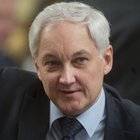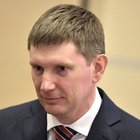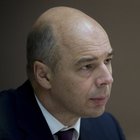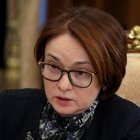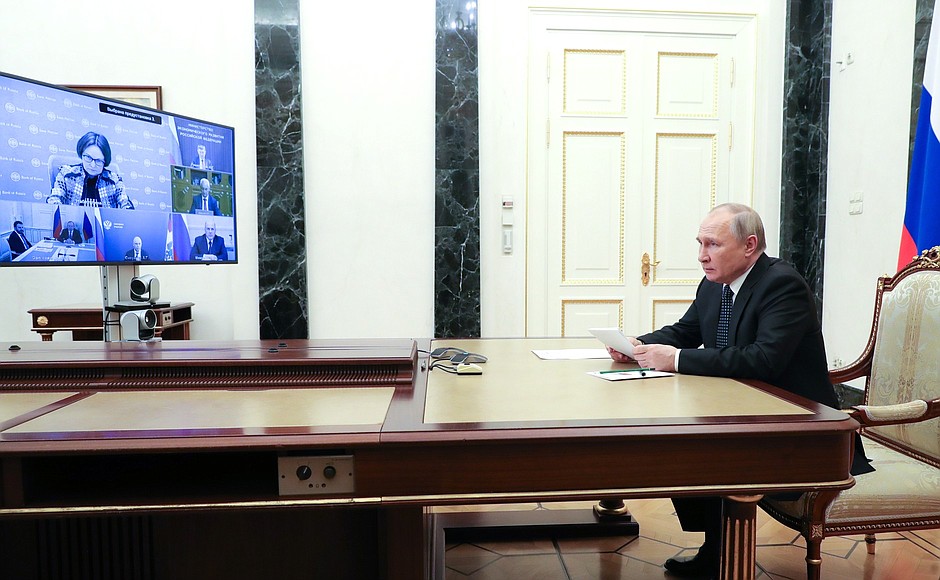
The meeting was attended by Prime Minister Mikhail Mishustin, Chief of Staff of the Presidential Executive Office Anton Vaino, First Deputy Prime Minister Andrei Belousov, Presidential Aide Maxim Oreshkin, Minister of Economic Development Maxim Reshetnikov, Finance Minister Anton Siluanov and Central Bank Governor Elvira Nabiullina.
* * *
Opening remarks at the meeting on economic issues
President of Russia Vladimir Putin: Good afternoon, colleagues,
We have agreed to hold regular meetings on the situation in the Russian economy and monitor changes in key macroeconomic indicators that characterise business, investment activity and labour market dynamics.
Naturally, this work is of special importance because based on the detailed analysis and consideration of potential risks, we have taken and will take measures on additional support for our people, industries and companies, as well as the economy as a whole.
I would like to emphasise that the economy continues to stabilise. Inflation has slowed; weekly price increases have approached normal levels, and prices on some goods have started dropping.
Analysts believe that two major factors are playing a role in this: the currency market situation, where the ruble has been rapidly growing stronger again, and the second factor, the consumer demand dynamic. I would like to emphasise that after a surge in February and March, consumer activity has objectively declined.
It is very important not to lose control of the situation and to prevent a misbalance in economic dynamics. On the one hand, we need to ensure gradual normalisation of pricing dynamics, and on the other, it is essential to prevent a serious reduction in demand, which could lead to setbacks in the operation of companies and a decrease in budget revenues.
So, in the current situation, it is necessary to support domestic companies to enable them to increase the supply of goods and services. It is also important to encourage domestic demand and the purchasing power of the population.
In this respect, I would like to draw your attention to key, important factors like the employment rate and average income. As I have said more than once, we will judge the efficiency of our economic policy with these indicators.
I should note that the lower lending activity of the banking system is affecting the final demand. Commercial risk and growing interest rates are the reason. Everybody understands that. We know this.
Let me remind you that the key rate increase by the Central Bank was, however, justified and necessary to stabilise the banking sector and financial markets. The decision proved successful and the Bank of Russia is already lowering the key rate gradually, which will make loans cheaper. Other steps are possible based on the real situation in the sector, but this is the prerogative of the Central Bank.
It is important that the Government is also issuing directives to complement these measures. Special programmes to support key industries have been launched. Easy-term loans are available to backbone enterprises in industrial production, trade, agriculture, oil processing and construction. Companies in these industries are also eligible for guarantees from VEB.RF worth a total of 800 billion rubles.
I would like to add that, despite the current challenges, we are keeping the easy-term mortgage programmes, including mortgages for families, with more funds allocated from the federal budget.
At the same time, I believe it is necessary to issue additional directives – primarily, with respect to mortgages. As we can see, the dynamic here is slower than the forecasts, and to make buying homes more accessible to people and stimulate real estate development in general, I propose lowering the easy-term mortgage rate from the recently set 12 percent to 9 percent per annum. Yes, we did recently set this interest rate at 12 percent but the overall situation is positive, which makes it possible to lower it. It is also necessary to extend the easy-term mortgage programme until the end of this year.
Next subject. Many companies are still experiencing a serious shortage of working capital that is used to purchase raw materials, components and services. This shortage must be compensated for. Our business colleagues always mention this at our industry-specific meetings. Therefore, I believe it is possible to introduce two new measures.
I propose expanding the guaranteed support programme by VEB beyond the backbone companies to provide support to other enterprises that do not have this status yet but that are already larger than small and medium-sized businesses and operate in the real sector. I should remind you as well that we already have some special support measures in place for smaller businesses. The VEB guarantees will account for up to 50 percent of a loan. I believe that the total value of the loans supported by this programme must be around 1.1 trillion rubles.
The second thing. I suggest granting a delay in insurance premium payments for companies that supply the domestic market with goods and services. We have talked at length about various support instruments such as a high Central Bank rate, as I mentioned. We have also talked about different support mechanisms for companies and sectors, but this is a systemic measure that covers almost all of the economy. I suggest suspending these payments for one year.
I would like to clarify right now that this measure would apply to all the companies I just mentioned. This list will not include exporters, financial and wholesale trade companies or public sector organisations. The Government will determine a precise list of the sectors included.
A grace period, for suspending these insurance payments, will cover the second quarter of this year. This grace period will also run through the third quarter for manufacturing companies.
We estimate that this measure will apply to over 2.8 million companies with almost 52 million workers. It will allow businesses to keep about 1.1 trillion rubles in the second quarter and another half a trillion rubles in the third quarter. These funds will work inside the economy, ensuring the production cycle. They will provide additional support for related companies, suppliers and contractors.
Let me repeat: insurance payments for the second and third quarters will have to be made starting in May 2023. Moreover, we can also think about additional preferences for manufacturing companies as regards payments in the third quarter. I will not go into detail right now, but it will be possible to do this if the employment and payroll funds are kept at June 1, 2022 levels.
I would like to ask the Government to draft detailed proposals on the criteria for these benefits based on the economic situation in general. I have special instructions for the Finance Ministry – to anticipate compensating for the shortfall in revenue in extra-budgetary funds. This must have enough money to ensure the confident operation of the healthcare and social support systems.
And, of course, I am instructing the Government, in cooperation with the Bank of Russia, to closely follow all developments and analyse the efficiency of the suggested mechanisms with a view to making adjustments whenever necessary.
Let’s get down to discussing today’s agenda.
Ms Nabiullina, go ahead please.


